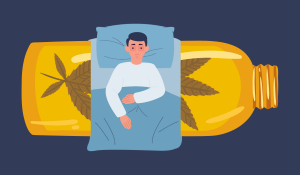Pets, like humans, may suffer from a variety of conditions for which CBD can help: anxiety, inflammation, pain, and even epilepsy, among others. CBD has been less studied in pets than humans, but there is evidence that it can be helpful. Side effects may include dry mouth, lowered blood pressure, drowsiness, and more. It is important to consult with a vet before giving CBD to your pet.
Many pet owners may be interested in using CBD for their pets. CBD is known to have many therapeutic properties in humans — including anti-inflammatory properties, anti-anxiety properties, pain relieving properties, and more — and many owners may wish to apply these effects to their pets in safe and natural ways.
While research on the effects of CBD on pets is far less substantial than that in humans — leading many owners to ask: can CBD be harmful for pets? — the fact is that there is considerable anecdotal evidence, and some clinical evidence, that CBD can be well-tolerated by many pets.
Research on CBD’s effect on pets remains somewhat limited. However, some studies have been done. One study on CBD for pets showed no significant adverse effects on cats and dogs; however, the study did suggest that ingesting CBD might be less well-tolerated by cats.
CBD is generally used in pets to treat similar conditions to those humans experience: stress, anxiety, pain, inflammation, and more. CBD may also help with more complex conditions in pets (as with humans): one study suggested that CBD might have some effect on epilepsy in dogs.
In both humans and animals, CBD may produce a variety of side effects: dry mouth, lowered blood pressure, drowsiness, diarrhea, changes in some liver enzymes, and other, similar effects. If your pet is taking CBD, it is vitally important to pay close attention to their response, and stay on top of any potentially adverse effects related to CBD consumption.
Above all, it is extremely important to consult with your vet before using CBD for your pet. While it is often likely that CBD’s effects on your cat, dog, or other animal will be mild, the lack of clinical research on CBD in pets should be considered. Your vet may suggest other treatments for addressing problems your pet is having. Your vet can also help highlight the importance of the right dosage of CBD for pets, as pet dosage will likely be considerably less than human dosage.

If you've ever wondered about using CBD for insomnia, you should know how CBD helps anxiety, stabilizes your sleep-wake cycle, and makes falling asleep easier.
Read More
Key Features Pros Cons Real User Experience Final Verdict: Is Five CBD Full-Spectrum CBD+THC Oil Worth It? Five CBD Full-Spectrum CBD+THC Oil delivers where it...
Read More
CBD-infused salad dressing: Imagine a fresh, crisp salad enhanced with a light, herbaceous vinaigrette containing your daily dose of CBD. To create this, you’ll need...
Read More
What are CBD beverages, exactly? They’re simply drinks infused with cannabidiol (CBD), a compound found in the hemp plant. Now, before you think “high,” to...
Read More
Importance of Quality Control in CBD Quality control is the backbone of a safe CBD product. Rigorous quality standards help ensure that products are consistent,...
Read More
Understanding the Grip of Anxiety: Recognizing the Signs Have you ever felt anxious before a big event? It’s a common experience. But when anxiety becomes...
Read More
CBD for Pets: A Pet Parent’s Guide to Dosage We all want the best for our pets, especially when they’re struggling with pain, anxiety, or...
Read More
1. What Is CBD and Why Is It a Game-Changer for Skin Health? CBD (cannabidiol) is a natural compound extracted from the hemp plant. Unlike...
Read More
Potential Health Benefits of CBD for Dogs and Cats Pain and Inflammation Relief CBD may alleviate pain and inflammation in pets with arthritis or joint...
Read More
Best CBD Gummies for Sleep and Relaxation: A Comprehensive Review Through extensive testing and analysis, they have discovered that the most effective options typically contain...
Read More